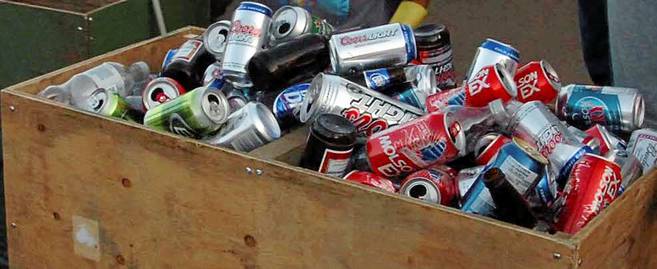
A new deposit means that aluminum cans or plastic bottles already purchased with a 5¢ deposit will give customers double the amount after this date. Additionally, aluminum containers of carbonated water or juice that are not currently returned will now be refunded at a rate of 10¢ each.
Another increase in the deposit, this time, also applies to glass containers of soft drinks of 500 ml or more, which will increase their deposit from 5¢ to 25¢. Faced with all these increases, it is tempting to postpone the exchange of stored containers in cuppers.
That’s because cuppers can be reprogrammed to recognize bar codes to reflect changes in prices, according to the Quebec Association for the Recovery of Beverage Containers (AQRCB). She also tries to warn people who are tempted by such practice.
“It has been brought to the attention of the AQRCB that information is being circulated to encourage the public to deliberately collect beverage containers which are currently subject to a 5¢ return, with a view to recovering a 10¢ amount for them after November 1, 2023. , and thus take unfair advantage of the implementation of new deposit rates. Any practice involving downstream recovery of undisbursed amount upstream is against the spirit of a deposit system based on ethical and responsible citizen participation. »
— October 20, 2023 update from the Quebec Association for the Recovery of Beverage Containers (AQRCB)
However, we cannot escape this, as we guarantee that there will be no “deposit police” checking purchase invoices for containers. AQRCB indicates that the recovery rate is currently 73%. The goal is to reach 90 percent
Decision for specific traders.
Further, certain traders will have to take a decision within an extended period from November 1, 2023 to March 1, 2025. Whether or not to always accept returnable containers.
The measure targets businesses with an area of less than 375 square meters (4,036 square feet), such as convenience stores or small grocery stores. They can opt out of collecting cans or bottles. However, they are responsible for indicating where the nearest collection point is using a standard poster.
And this is already starting to happen. Recently, in a Facebook post, Depannur Ferland at the island’s entrance informed its customers that they will no longer accept returnable containers from November 1st.
The publication sparked outrage, with some going so far as to suggest a boycott of the business. Others saw fit to come off the web pages of Recyc-Québec — which will no longer be responsible for shipments after Nov. 1 — insisting that all merchants selling returnable containers take them back.
It should be understood that the law has changed with the extended instructions. Even if the store no longer takes cans and bottles, a deposit is still required on the containers.
Groceries and supermarkets
On the other hand, all retailers that sell returnable beverages and have a surface area of more than 375 square meters (4,036 square feet) will be required to take back returnable beverage containers from November 1, 2023. During the transition period, they may decide to do so directly. or by integrating with other retailers.
From October 23, AQRCB is mapping collection points at the site cargo. AQRCB invites those who have not yet registered.
Additionally, all on-site consumption establishments, such as restaurants and corporate cafeterias, will be required to participate in the deposit beginning November 1. Establishments serving meals to at least 75 people at a time must register AQRCB website In the month of October.
No 20¢ cans after November 15th
Finally, let’s not forget that 450 ml or larger aluminum beer cans listed at 20¢ will drop to 10¢. According to the AQRCB, “for reasons of authenticity”.
Customers who own such containers can get a 20¢ deposit refund until November 15. “On November 16, they will receive 10¢,” AQRCB CEO Normand Bisson said at a September press conference.
From November 1, buyers of beer cans of 450 ml or larger must pay a 10¢ deposit.
As of March 1, 2025, the start date of the second phase of the deposit reform, drop-off locations where it will be possible to exchange bottles of wine or spirits as well as coated cardboard containers.





More Stories
Sportswear: Lolle acquires Louis Garneau Sports
REM is still innovative enough to foot the bill
A trip to the restaurant with no regrets for these customers